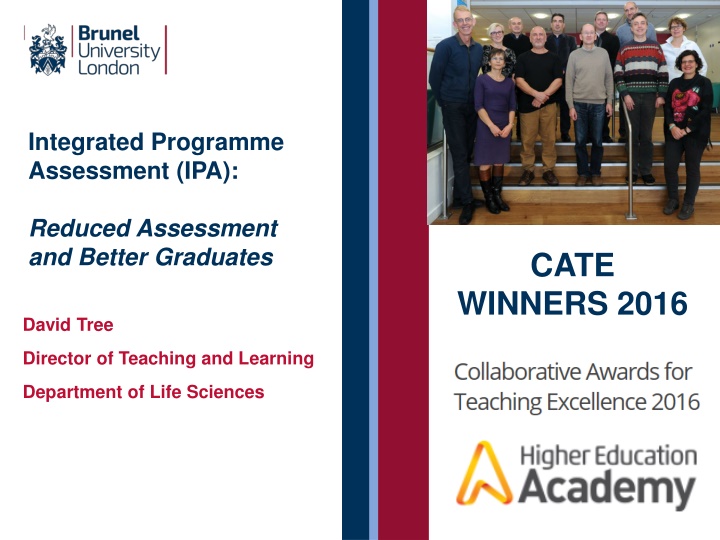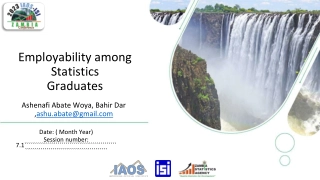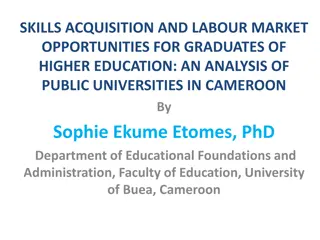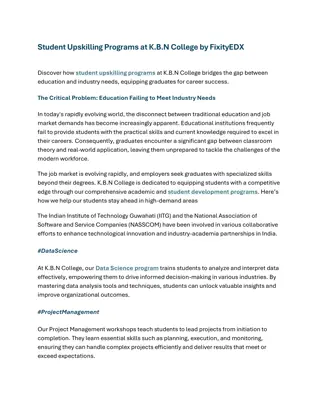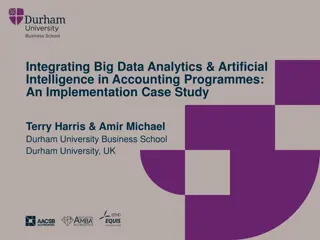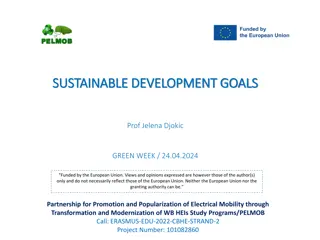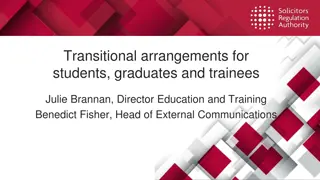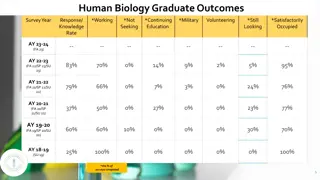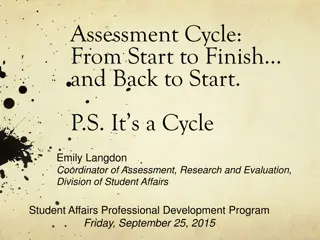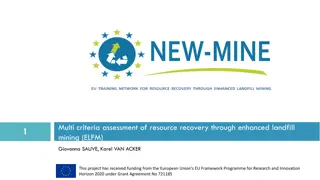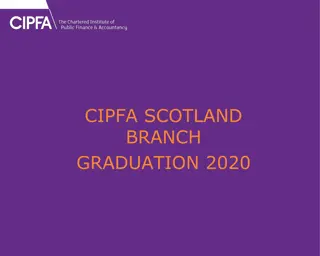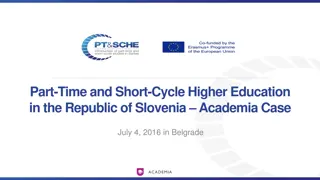Enhanced Assessment for Better Graduates: A Case Study in Higher Education
Integrated Programme Assessment (IPA) at Brunel University London has transformed teaching and learning by reducing assessment burden, improving graduate attributes, and enhancing student outcomes through innovative assessment strategies. This case study showcases the impact of IPA on student achievement and attainment gaps, highlighting the success of integrating authentic assessments to develop critical thinking and reflective learning skills.
Download Presentation

Please find below an Image/Link to download the presentation.
The content on the website is provided AS IS for your information and personal use only. It may not be sold, licensed, or shared on other websites without obtaining consent from the author.If you encounter any issues during the download, it is possible that the publisher has removed the file from their server.
You are allowed to download the files provided on this website for personal or commercial use, subject to the condition that they are used lawfully. All files are the property of their respective owners.
The content on the website is provided AS IS for your information and personal use only. It may not be sold, licensed, or shared on other websites without obtaining consent from the author.
E N D
Presentation Transcript
Integrated Programme Assessment (IPA): Reduced Assessment and Better Graduates CATE WINNERS 2016 David Tree Director of Teaching and Learning Department of Life Sciences
HE sector context Learning Outcomes transparency of how students demonstrate achievement UK/international interest in IPA driven by: - concerns about over-assessment - need for authentic assessments - we test what is easy to test .. - standards based assessment - sustainable assessment 2 Brunel University London
Drivers for change (2010) Heavy assessment burden Increased student numbers Many low-credit pieces of assessment Improve graduate attributes Application of knowledge Senate Regulations (2009) - uncoupled teaching and assessment Develop range of skills In silo learning 3 Brunel University London
Integrated Programme Assessment (IPA): Teaching and Assessment uncoupled T T T T Module T A A A A A T T T T T A A A Separating study and assessment reflects real life we integrate information from many sources to solve a problem 4 Brunel University London
What we achieved Reduced summative assessment burden by 2/3 Marked pieces of work/year 10,000 Designed meaningful assessments that develop: critical and analytical thinking application of knowledge independent and reflective learning 8,000 6,000 4,000 2,000 0 Give all students the same learning/development opportunities Pre-IPA Post-IPA Improved student experience and outcomes 5 Brunel University London
Student Awards Data Degree Outcomes 90.00 80.00 Percentage 1st/2.1 70.00 60.00 50.00 40.00 30.00 20.00 10.00 0.00 2011-12 2012-13 2013-14 2014-15 2015-16 Pre-IPA Post-IPA Degree outcomes have improved using the synoptic approach compared to the modular programme. 6 Brunel University London
Closing the Attainment Gap 2012-2013 2015-2016 12.5% 7.5% -5% Pre-IPA Post-IPA Attainment gap reduced using the integrated assessment approach compared to the modular programme. 7 Brunel University London
Graduate Level Outcomes 100% 90% 80% 70% 60% Unemployed 50% Non-grad work Grad work 40% Studying 30% 20% 10% 0% 2011/12 2012/13 2013/14 2014/15 2015/16 Pre-IPA Post-IPA Positive graduate level outcomes increased; negative outcomes decreased 8 Brunel University London
Students feel better prepared for employment Prepared for Employment 90 80 70 PERCENTAGE 60 50 DLS BIO 40 30 20 10 0 2012-13 Pre-IPA 2014-15 Post-IPA Biomedical Sciences graduates feel better prepared for employment than Department of Life Sciences graduates 9 Brunel University London
NSS Assessment and Feedback 2013 2015 Biosciences 73% 79% +6% Brunel 72% 71% -1% Sector 74% 76% +2% Pre-IPA Post-IPA National subject ranking increased from 28th to 8th 10 Brunel University London
Senate Regulation changes From: must normally undertake modules to a value of at least 120 credits at each level To: A normal period of study will be approved for each programme Each year of full-time study shall normally be equivalent to 120 credits of assessment 11 Brunel University London
IPA in five easy steps 1. What is the purpose of the programme who is it for? Aim 2. What do we want graduates to know; be able to do; skills/competencies? Learning Outcomes 3. What assessments are needed/appropriate to demonstrate learning outcomes are met? Assessment Strategy 4. How are students best supported to be successful in assessments? Teaching Strategy 5. What content needs to be covered, in what sequence, by whom, etc. Delivery 12 Brunel University London
Graduate Attributes Related image Informed by: Benchmark Statements PSRB requirements 13 Brunel University London
Assessment follows Blooms taxonomy Related image 14 Brunel University London
Assessment focussed on skills Skills Related image Subject Knowledge, Understanding Integration Communication Analysis/ Evaluation Professional development 15 Brunel University London
Assessment focussed on skills Skills Assessment L Communication Subject Knowledge, Understanding Integration Subject specific and synoptic exams 4 The ability to communicate basic scientific topics Report Final Year Project Presentations Scientific reports and papers 5 The ability to communicate scientific data and literature Journal manuscript Communication Analysis/ Evaluation Literature Data Problem Solving 6 Effectively communicate complex scientific information Dissertation Professional development Portfolios 16 Brunel University London
Coherence within and between levels Agder University 16 October 2017 17 Brunel University London
IPA - Level 4 Study Critical Thinking (5) Research skills (15) Practical skills (20) Biology of the cell (40) Biochemistry (20) Anatomy & Physiology (20) 18 Brunel University London
IPA - Level 4 Assessment Synoptic Exam 1 (20) Biomedical Sciences Exam 1 (20) Practical Skills: Molecular Analysis (20) Practical Skills: Biochemical Analysis (20) Practical skills: Microscopy (20) Research Skills & Communic- ation (20) Study Critical Thinking (5) Research skills (15) Practical skills (20) Biology of the cell (40) Biochemistry (20) Anatomy & Physiology (20) 19 Brunel University London
IPA - Level 4 Assessment Synoptic Exam 1 (20) Biomedical Sciences Exam 1 (20) Practical Skills: Molecular Analysis (20) Practical Skills: Biochemical Analysis (20) Practical skills: Microscopy (20) Research Skills & Communic- ation (20) Study Critical Thinking (5) Research skills (15) Practical skills (20) Biology of the cell (40) Biochemistry (20) Anatomy & Physiology (20) 20 Brunel University London
IPA - Level 4 Assessment Synoptic Exam 1 (20) Biomedical Sciences Exam 1 (20) Practical Skills: Molecular Analysis (20) Practical Skills: Biochemical Analysis (20) Practical skills: Microscopy (20) Research Skills & Communic- ation (20) Study Critical Thinking (5) Research skills (15) Practical skills (20) Biology of the cell (40) Biochemistry (20) Anatomy & Physiology (20) 21 Brunel University London
IPA - Level 4 Assessment Synoptic Exam 1 (20) Biomedical Sciences Exam 1 (20) Practical Skills: Molecular Analysis (20) Practical Skills: Biochemical Analysis (20) Practical skills: Microscopy (20) Research Skills & Communic- ation (20) Study Critical Thinking (5) Research skills (15) Practical skills (20) Biology of the cell (40) Biochemistry (20) Anatomy & Physiology (20) 22 Brunel University London
IPA - Level 4 Assessment Synoptic Exam 1 (20) Biomedical Sciences Exam 1 (20) Practical Skills: Molecular Analysis (20) Practical Skills: Biochemical Analysis (20) Practical skills: Microscopy (20) Research Skills & Communic- ation (20) Critical Thinking (5) Research skills (15) Practical skills (20) Biology of the cell (40) Biochemistry (20) Anatomy & Physiology (20) 23 Brunel University London
Practical Skills: Microscopy From Study Blocks: Anatomy and Physiology: Function and histology of the human digestive tract Biology of the Cell: Differentiation of different and potentially pathogenic bacteria Practical Skills: Enumeration of cells with a counting chamber and a microscope Research Skills: Using a microscope safely and correctly Brunel University London
Practical Skills: Microscopy The students are faced with the clinical scenario of a patient suffering from abdominal pain. Brunel University London
Practical Skills: Microscopy The students are faced with the clinical scenario of a patient suffering from abdominal pain. Abdominal pain could be caused by Brunel University London
Practical Skills: Microscopy The students are faced with the clinical scenario of a patient suffering from abdominal pain. Abdominal pain could be caused by A) histological (structural) changes Brunel University London
Practical Skills: Microscopy The students are faced with the clinical scenario of a patient suffering from abdominal pain. Abdominal pain could be caused by A) histological (structural) changes B) an unusually high number of bacteria normally present in the gut, or Brunel University London
Practical Skills: Microscopy The students are faced with the clinical scenario of a patient suffering from abdominal pain. Abdominal pain could be caused by A) histological (structural) changes B) an unusually high number of bacteria normally present in the gut, or C) by a bacterial or fungal species not normally present in the gut. Brunel University London
Practical Skills: Microscopy The students are faced with the clinical scenario of a patient suffering from abdominal pain. Abdominal pain could be caused by A) histological (structural) changes B) an unusually high number of bacteria normally present in the gut, or C) by a bacterial or fungal species not normally present in the gut. Students have to assess histology images of the digestive tract as well as routine microbiology procedures such as Gram staining and microbiological enumeration techniques in order to establish what might be the cause of problems for a patient Brunel University London
IPA - Level 5 Assessment Data Synoptic Exam 2 (20) Biomedical Sciences Exam 2 (20) Professional Skills (20) Primary Literature Interrogation and Synthesis (20) Data Analysis, Interpretation and Presentation (20) Evaluation and Reporting (20) Study Critical Thinking (5) Career skills (15) Molecular and Cellular Biology (20) Genetic Engineering and Immunobiology (20) Principles of Human Disease (20) Analytical Biochemistry(20) Medical Biochemistry (20) Metabolic Regulation (20) Genetics & Development (20) 31 Brunel University London
IPA - Level 5 Assessment Data Synoptic Exam 2 (20) Biomedical Sciences Exam 2 (20) Professional Skills (20) Primary Literature Interrogation and Synthesis (20) Data Analysis, Interpretation and Presentation (20) Evaluation and Reporting (20) Study Critical Thinking (5) Career skills (15) Molecular and Cellular Biology (20) Genetic Engineering and Immunobiology (20) Principles of Human Disease (20) Analytical Biochemistry(20) Medical Biochemistry (20) Metabolic Regulation (20) Genetics & Development (20) 32 Brunel University London
IPA - Level 5 Assessment Data Synoptic Exam 2 (20) Biomedical Sciences Exam 2 (20) Professional Skills (20) Primary Literature Interrogation and Synthesis (20) Data Analysis, Interpretation and Presentation (20) Evaluation and Reporting (20) Study Critical Thinking (5) Career skills (15) Molecular and Cellular Biology (20) Genetic Engineering and Immunobiology (20) Principles of Human Disease (20) Analytical Biochemistry(20) Medical Biochemistry (20) Metabolic Regulation (20) Genetics & Development (20) 33 Brunel University London
Data Analysis, Interpretation and Presentation Poster presentation based on case study Students are given raw data (similar to that generated in laboratory practical experiments): - Histology Sections (exfoliative smears, liver biopsy) - ELISA data - CD4 T cell counts - Liver enzyme assays Data is analysed and formatted for presentation Concludes with likely prognosis and possible treatments Presented at the Brunel Symposium on Opportunistic Infections in Diseases of the Immune System 34 Brunel University London
IPA - Level 6 Assessment Problem Solving and Data Analysis (20) Biomedical Sciences Exam 3 (20) Synoptic Exam 3 (20) Scientific Communication (20) Final Year Project (40) Study Forensic Investigation (20) Genomic Technologies (20) Term 2 Option 1 (20) Term 2 Option 2 (20) Term 2 Option 3 (20) Medical Biochemistry (20) Microbial Pathogenesis (20) 35 Brunel University London
IPA - Level 6 Assessment Problem Solving and Data Analysis (20) Biomedical Sciences Exam 3 (20) Synoptic Exam 3 (20) Scientific Communication (20) Final Year Project (40) Study Forensic Investigation (20) Genomic Technologies (20) Term 2 Option 1 (20) Term 2 Option 2 (20) Term 2 Option 3 (20) Medical Biochemistry (20) Microbial Pathogenesis (20) 36 Brunel University London
IPA - Level 6 Assessment Problem Solving and Data Analysis (20) Biomedical Sciences Exam 3 (20) Synoptic Exam 3 (20) Scientific Communication (20) Final Year Project (40) Study Forensic Investigation (20) Genomic Technologies (20) Term 2 Option 1 (20) Term 2 Option 2 (20) Term 2 Option 3 (20) Medical Biochemistry (20) Microbial Pathogenesis (20) 37 Brunel University London
Problem Solving and Data Analysis Coursework Portfolio of work from three options Biology, Genetics and Treatment of Cancer Different options do different work BUT they all involve solving problems by analysing data Cellular Pathology Endocrine Disorders Genomic Medicine Medical Immunology Fulfil the same learning outcomes Molecular Pharmacology and Toxicology Brunel University London
Synoptic Exam A seen exam - question released 7 days in advance At every level, increasing in difficulty and complexity Expectation that students will: o integrate knowledge and information from across the degree and wider subject area o show engagement with, and critical understanding of, the primary academic literature o demonstrate understanding of relevant ethical issues 39 Brunel University London
Main Challenge = Main Strength Collegial and team-based approach 40 Brunel University London
Building a successful team 15 February 2025 Who is needed? Students Staff Experts in Programme Design Taught Programmes Office 41 Presentation Title Brunel University London
Main Challenge - Collegial and team-based approach Overcoming You re messing with MY module Staff need to know more about what (and how) colleagues teach Multiple markers for each assessment requires thorough moderation Need to be creative with synoptic assessment Weaker areas are exposed (exam only blocks) 42 Brunel University London
Benefits Students Fewer more interesting assessments Formative activities supports learning Recognise graduate attributes Staff Assessment burden is reduced Marking is shared Teaching has become a community property Better students outcomes Better preparation for employment Increased student satisfaction Highlighted as good practice by professional bodies 43 Brunel University London
Stakeholder Perspectives: Student Feedback I have to deliver presentations, communicate with clients at face to face meetings, deliver training - all of which require good oral presentation skills and some degree of confidence. Posters and presentations are great practice for that, in addition to being good practice at presenting information visually in an easy to read and attractive manner. Talks and the 'conference style' poster presentations were also really good for developing networking skills, something that's come in really handy being in a client-facing position - (2015 Graduate) 44 Brunel University London
Stakeholder Perspectives: PSRB and Design Panel Comments 15 February 2025 At Accreditation events PSRBs have identified the use of study and assessment blocks as an example of good practice. - Royal Society of Biology Accreditation Dec 2014 At re-approval events, this structure has been commended for its flexibility: the Panel commended a very well thought out and re-designed programme with clear documentation which made excellent use of the new freedom of the programme . - Re-approval BSc OT January 2012 45 Brunel University London
Stakeholder Perspectives: External Examiners 15 February 2025 External Examiners confirm: the methodology of separating assessment blocks from teaching blocks, should increase the abilities of students to synthesise material and develop critical thinking and should be commended . [the synoptic approach allows] students scope to bring together material in such a way that must enhance their overall understanding . 46 Brunel University London
Stakeholder Perspectives: Staff Comments 15 February 2025 My initial reservation with the programme-level learning and assessment strategy for The Division of Biosciences centred on the introduction of non-assessed exercises within the curriculum. For example a number of laboratory assessment were not directly assessed with a formal linked assessment. However, having seen the strategy operate for a few academic cycles, I am convinced that a programme (rather than modular) level assessment strategy is advantageous because it prevents a silo approach to learning and encourages students to take a wider view in their learning strategies. It also permits a wider use of synoptic assessments which allows a more effective assessment of student knowledge and skills and allows constructive alignment of learning and assessment - Former Staff Member 47 Brunel University London
Requirements for IPA 1. Regulations that accommodate separation of teaching/study and assessment 2. Collegial and team/based approach 3. Vision of what is to be achieved 4. Plan everything (coordinators/marking/moderation) HEA Annual Conference 6 July 2017 48 Brunel University London
Happy-o-meter of IPA approach Why wouldn t it work for you? http://www.brunel.ac.uk/about/education-innovation 49 Brunel University London
Integrated Programme Assessment (IPA): Reduced Assessment and Better Graduates CATE WINNERS 2016 David Tree Director of Teaching and Learning Department of Life Sciences
